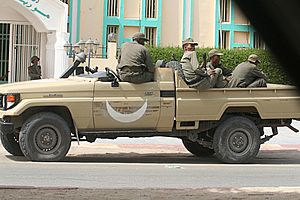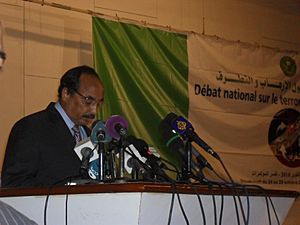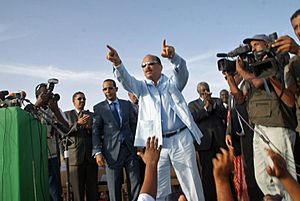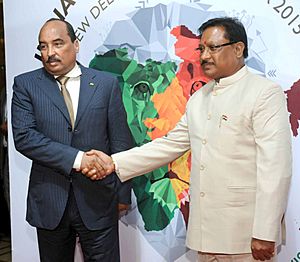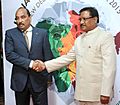Mohamed Ould Abdel Aziz facts for kids
Quick facts for kids
General
Mohamed Ould Abdel Aziz
|
|
|---|---|
|
محمد ولد عبد العزيز
|
|
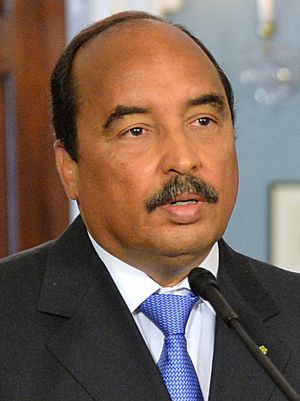
Mohamed in 2014
|
|
| 8th President of Mauritania | |
| In office 5 August 2009 – 1 August 2019 |
|
| Prime Minister |
|
| Preceded by | Sidi Ould Cheikh Abdallahi |
| Succeeded by | Mohamed Ould Ghazouani |
| 12th Chairperson of the African Union | |
| In office 30 January 2014 – 30 January 2015 |
|
| Preceded by | Hailemariam Desalegn |
| Succeeded by | Robert Mugabe |
| President of the High Council of State | |
| In office 6 August 2008 – 15 April 2009 |
|
| Prime Minister | Moulaye Laghdaf |
| Preceded by | Office established |
| Succeeded by | Office abolished |
| Personal details | |
| Born | 20 December 1956 Akjoujt, Mauritania, French West Africa |
| Nationality | Mauritanian |
| Political party | Union for the Republic (UPR) |
| Spouse | Mariam Mint Ahmed Aicha |
| Occupation |
|
| Military service | |
| Allegiance | Mauritania |
| Branch/service | Mauritanian Army |
| Years of service | 1977 – 2009 |
| Rank | General |
Mohamed Ould Abdel Aziz (born 20 December 1956) is a retired military officer and politician from Mauritania. He served as the 8th President of Mauritania from 2009 to 2019.
He was an important figure in the August 2005 event that removed President Maaouya Ould Sid'Ahmed Taya. Later, in August 2008, he led another event that removed President Sidi Ould Cheikh Abdallahi. After the 2008 event, Mohamed became president of the High Council of State. This was part of a plan to prepare for a new election.
He stepped down from that role in April 2009 to run in the July 2009 presidential election, which he won. He became president in August 2009. He was re-elected in 2014. He did not seek re-election in 2019. Mohamed Ould Ghazouani took over as president in August 2019.
Mohamed also served as the chairman of the African Union from 2014 to 2015.
Contents
Early Life and Military Career
Mohamed Ould Abdel Aziz was born in Akjoujt on 20 December 1956. He joined the Meknes Royal Military Academy in Morocco in 1977. He was promoted several times and created a special unit called BASEP (Presidential Security Battalion).
He played a key role in stopping an attempted military takeover in June 2003. He also helped stop a military uprising in August 2004. For his actions in stopping the 2004 uprising, he received Mauritania's highest military award.
Role in the 2005 Political Change
A military event on 3 August 2005, led by Ely Ould Mohamed Vall and Colonel Mohamed Ould Abdel Aziz, removed President Maaouya Ould Sid'Ahmed Taya from power. Colonel Mohamed was one of the main people involved in carrying out this change.
At that time, some people described Mohamed as a leader who wanted a strong, united Arab nation. Others wondered if he truly supported democracy and fairness for all people in Mauritania. However, the Mauritanian press gave Mohamed credit for helping to shorten military rule and for trying to prevent cheating in the upcoming elections.
Working with President Sidi Abdallahi
On 30 August 2007, President Sidi appointed Mohamed as his Presidential Chief of Staff. Mohamed, who was now a General, continued to work closely with the President. In early 2008, he was sent by the President to meet with King Mohammed VI of Morocco.
General Mohamed also led the forces that captured militants who had killed four French tourists in December 2007. There were signs of disagreement between Mohamed and the President in June 2008. Some political parties believed Mohamed was planning a change in government.
On 4 August 2008, many members of the ruling party left, which made it difficult for the president to govern. This was said to be influenced by military leaders.
Leading the 2008 Political Change
The Events of 6 August
On 6 August 2008, President Abdallahi ordered Mohamed and several other senior officers to be removed from their commands. Soon after, troops from BASEP took control of the President, Prime Minister, and Interior Minister in the capital city, Nouakchott.
Mauritanian television went off the air. Later, a TV channel based in Saudi Arabia announced that a new military group had taken charge. An official statement on 7 August said that President Sidi's powers were ended. Mauritania would be led temporarily by an 11-member High Council of State, with Mohamed as its president. They promised to hold a new presidential election as soon as possible.
The Transition Period
Many Western governments did not approve of the 2008 events. France, a former colonial power, strongly criticized the change. In the two weeks after 6 August, Mohamed met with many foreign groups and spoke with international media. He said his actions were legal and a response to problems with the previous government. He also said that while he was "forced to take power," he did not want to stay in power forever. However, he did not rule out running in the promised elections.
Mohamed's first list for the High Council of State included some civilians, but this was quickly changed to include only military figures. There were small protests, some against the change and some supporting the military. Mohamed spoke at a rally where people carried his photographs. Within a week, most of the Mauritanian Parliament voted to support the change. On 13 August, Mohamed appointed Moulaye Ould Mohamed Laghdaf as Prime Minister of Mauritania. The Council stated that Mohamed had the power to appoint government officials.
Stabilizing the Situation
Some neighboring countries, like Morocco, showed support for the new government. Libya and Senegal also eventually supported it. However, the Algerian government strongly opposed the change.
The United States consistently stated that the change was against the law. The African Union also condemned Mohamed and placed travel bans and asset freezes on those involved.
The BBC noted that Mohamed, who was seen as a helper in the 2005 change, was now seen as the main power behind the previous military government. It was also noted that government staff already called him "president." An ally of Mohamed described him as "a simple man, who likes order." Mohamed often spoke against corruption and government inaction. He also stressed his strong opposition to extremism.
The 2009 Presidential Election
The temporary government led by General Mohamed promised to hold a fair election for president on 6 June 2009. On 5 February 2009, Mauritanian state media reported that the General would run as a candidate in that election.
To be a candidate, Mohamed had to step down as Head of State. He did so on 15 April, and the President of the Senate, Ba Mamadou Mbaré, took over temporarily. Some opposition groups said this was just a trick and that the General still held the real power.
The Union for the Republic political party chose Mohamed as its president on 5 May 2009. In the presidential election held on 18 July 2009, Mohamed won more than half of the votes in the first round (52.58%). He then resigned as party leader on 2 August 2009, because the President of Mauritania cannot be a member of any political party.
Mohamed Ould Abdel Aziz officially became President at a ceremony in Nouakchott on 5 August 2009.
2012 Shooting Incident
Mohamed was shot on 13 October 2012. The country's Communications Minister said the president was shot in the arm. Initially, Mauritanian radio reported it was an assassination attempt. However, Mohamed later said he was accidentally shot by an army unit and had minor injuries. He had a successful operation. Witnesses claimed he was directly targeted by men who then ran away.
Mohamed had an initial operation in Nouakchott. Then, he was moved to a military hospital in Paris, France, for more treatment.
His Time as President
In April 2010, Mohamed and the leaders of Mali, Niger, and Algeria met to discuss how to fight against terrorism.
In November 2012, the Government of Mauritania allowed privately owned TV stations for the first time. A plan for this had been made in 2010.
His party, the Union for the Republic, won the 2013 Mauritanian parliamentary election with 21% of the votes, gaining 15 seats in parliament. The party's president had told Mauritanians that a majority in parliament would help support the President's plans.
Mohamed ran for re-election in 2014, and he won against Biram Dah Abeid with almost 82% of the votes. Many opposition parties did not accept the election results. However, the African Union praised the elections for being mostly peaceful.
A vote took place in 2017 on two proposed changes. One was about getting rid of the Senate (a part of parliament) and replacing it with Regional Councils. The other was about national symbols, including changing the national flag by adding red bands to represent the sacrifices of the Mauritanian people. They also proposed changing the national anthem.
Mohamed Ould Mohamed asked Mauritania to stop hate speech. He led a rally to end ethnic tensions. He said he passed a law to stop "hateful, racist or violent speech."
Efforts Against Slavery
Since 2015, many protests have happened against slavery in Mauritania. Protesters said the government was not fully putting anti-slavery laws into action. Aziz and the Government of Mauritania stated that slavery had not existed in the country since 1981. Mauritania was the last nation to officially end slavery.
In March 2013, Mohamed created an agency to help stop slavery. It was called the "National Agency to Fight against the Vestiges of Slavery, Integration, and Fight against Poverty."
The 2019 Election
Mohamed did not run for re-election in 2019. He was peacefully succeeded by Mohamed Ould Ghazouani, who was a close friend at the time.
Images for kids
See also
 In Spanish: Mohamed Uld Abdelaziz para niños
In Spanish: Mohamed Uld Abdelaziz para niños
 | Georgia Louise Harris Brown |
 | Julian Abele |
 | Norma Merrick Sklarek |
 | William Sidney Pittman |


